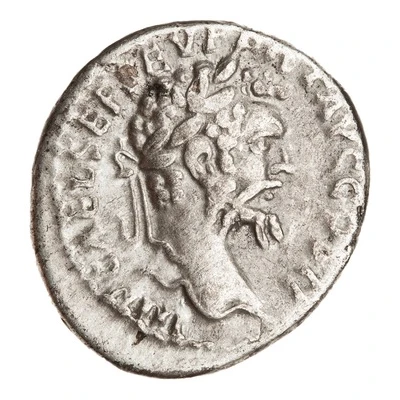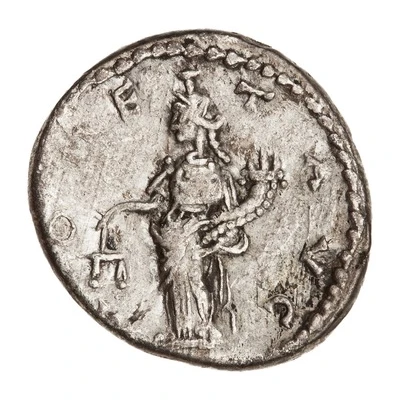


© American Numismatic Society (ANS)
Denarius - Septimius Severus MONET AVG; Moneta
| Silver | 3.3 g | 18 mm |
| Issuer | Rome › Roman Empire (27 BC - 395 AD) |
|---|---|
| Emperor | Septimius Severus (Lucius Septimius Severus) (193-211) |
| Type | Standard circulation coin |
| Years | 194-195 |
| Value | 1 Denarius |
| Currency | Denarius, Reform of Augustus (27 BC – AD 215) |
| Composition | Silver |
| Weight | 3.3 g |
| Diameter | 18 mm |
| Shape | Round (irregular) |
| Technique | Hammered |
| Orientation | Variable alignment ↺ |
| Demonetized | Yes |
| Updated | 2024-10-05 |
| Numista | N#269641 |
|---|---|
| Rarity index | 95% |
Reverse
Moneta, draped, standing left, holding scales in extended right hand and cornucopiae in left hand.
Script: Latin
Lettering: MONET AVG
Translation:
Moneta Augusti.
The mint of the emperor (Augustus).
Comment
Mass varies: 2.695–4.473 g;Diameter varies: 17.07–19.25 mm;
Example of this type:
American Numismatic Society (ANS)
Source:
Online Coins of the Roman Empire (OCRE)
Interesting fact
The Denarius - Septimius Severus coin was minted during a time of significant economic and political change in the Roman Empire. The coin's design features the image of the Roman goddess Moneta, who was associated with money and commerce, on the obverse (front side), and an inscription reading "MONET AVG" on the reverse (back side). This inscription stands for "Moneta Augusti," which translates to "Money of the Emperor," highlighting the coin's connection to the Roman imperial power. The use of silver in the coin's composition was also significant, as it reflected the value placed on this precious metal during the time. The weight of the coin, 3.3 grams, was also carefully controlled to ensure consistency in the currency's value and to prevent counterfeiting. Overall, the Denarius - Septimius Severus coin offers a fascinating glimpse into the economic and political climate of the Roman Empire during the 2nd century AD, and its design and composition continue to be of interest to historians and collectors today.